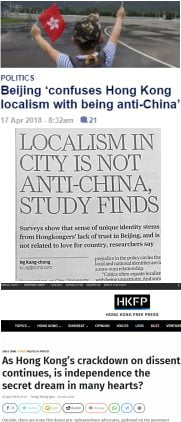A City University academic survey suggests that Beijing’s heavy-handed approach to pushing patriotism in Hong Kong alienates people and encourages the sense of local identity it aims to curb. No great surprise for most of us – but it might be news to our local leadership, which is slavishly implementing Beijing’s directives to ban disrespect to the national anthem and generate panic about ‘independence’ talk.
 Perhaps without realizing it, one of the researchers touches on some sensitive areas. She asserts that local and national identities are not in a zero-sum relationship, even though Chinese Communist Party ethnic and cultural policy in non-Han regions like Tibet and Xinjiang clearly assumes that the two are indeed in a struggle for supremacy. She also says:
Perhaps without realizing it, one of the researchers touches on some sensitive areas. She asserts that local and national identities are not in a zero-sum relationship, even though Chinese Communist Party ethnic and cultural policy in non-Han regions like Tibet and Xinjiang clearly assumes that the two are indeed in a struggle for supremacy. She also says:
“Rather than stressing its overall control over the city or instilling nationalism, [Beijing] should try to restore Hong Kong people’s confidence in it.”
Presumably, she means confidence in the city and its future, though confidence in Beijing would mean much the same in practice.
There is a problem here because diminishing Hong Kong’s self-confidence as a successful and distinct – autonomous – society has been a core theme of Beijing since the handover in 1997, especially since 2003.
During the 1980s-90s, the local administration bolstered its legitimacy by being seen to promote the city’s own interests, colonial officials even clashing with UK counterparts on trade and other issues. And it encouraged hope in the future by emphasizing the sustainability of Hong Kong’s economic role as the place that performs the functions that can’t be done on the Mainland.
By contrast, the post-colonial regime and Beijing have encouraged the idea that Hong Kong’s economy depends on China’s benevolence. They have encouraged worries about Hong Kong ‘falling behind’ or ‘losing out’ to Shenzhen or Shanghai. And they have constantly stressed ‘integration’ with the Mainland as an economic necessity – now taking physical form in the Zhuhai Bridge and High-Speed Rail projects and the ‘Greater Bay Area’ concept, which seems to be about symbolic absorption of Hong Kong into a larger regional entity.
By accident or design, Beijing has made this something of a self-fulfilling prophecy by appointing increasingly incompetent local leaders who are mismanaging Hong Kong into stagnation and a downward trajectory.
City U’s researchers (presumably mainstream pro-democrats at heart) won’t want to hear this, but it is not a point of whether localists are ‘anti-Beijing’ – Beijing is anti-localist/Hong Kong identity, and that’s all that matters. The younger radicals get that.
Leninists don’t do hearts and minds, and only one side can ultimately win. HK Free Press picks up here with an illuminating discursion culminating in the question: will the Communist Party’s ongoing crackdown on dissent in Hong Kong create a silent and servile population, or will it eventually provoke a bigger anti-Beijing backlash?

Actually, Peking has been undermining HK’s autonomy since at least 1993, what with the personal attacks on Patten and the setting up of the “second stove”.
The answer to your last question, I’m afraid, is: yes. A sullen, cowed populace that hates China more and more, but has no hope of ever doing anything about it.
“Leninists don’t do hearts and minds“ – also explains the Ordure-flinging monkey’s daily vitriol in these comments.
The Ordure-flinger should read some Orwell. He might learn that it’s possible to be a socialist without ceasing to be a decent human being.
It’s certainly possible to be a socialist without being a neo-colonialist, race essentialising twat. You’d half expect him to start going on about phrenology.
I have no further comment to make on G. Adams.
OK with you, Hemmers?